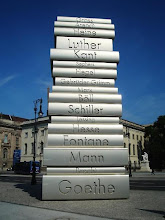I had been wanting to read this book for awhile and ended up enjoying it quite a bit. I had only a vague knowledge of Catherine and the role that she played in Russian history. Massie recounts Catherine's entire history from just before her birth in 1729 to her death in 1796. Many factors lead Catherine from a small Prussian province to the throne of one of Europe's mightiest empires. She was cousin to the prospective tsar, Peter of Holstein, and was considered a good match by those who wanted Russia to trade its alliance with Austria for an alliance with Prussia. But though life in the Russian court was glittering, it was not without its downsides. She was subject to the whims and ever changing moods of Empress Elizabeth. Her husband was an overgrown child with no sense of dignity and no love for his wife. And like all royal courts, this one was full of spies and people seeking to climb the ladder of success. But Catherine's intelligence, wit, and beauty charmed many people and eventually she found herself on the throne and loved by the people she had adopted as her own.
Catherine's life was simply fascinating. One of the most interesting aspects was how much she was a product of the times she was living in. From a young age she was caught up in the ideas of Enlightenment. Voltaire, Diderot, and d'Alembert became not just her tutors in political thought, but her personal friends as well. Though she eventually gave up the idea of establishing a true Enlightened monarchy in Russia, it did lead to many changes and helped usher Russia into Western society. Social changes were begun during Catherine's reign, including changes to Russian law and more freedoms for the serfs. She also encouraged arts, culture, and education throughout the empire. This cultivation of the arts lead to the existence of many of the great Russian writers, musicians, and artists that we appreciate today. From Pushkin to Tolstoy to Tchaikovsky, I think it is safe to say that none of them would have existed as we knew them without Catherine the Great.
For all of the accomplishments of her reign, Massie never loses sight of the fact that she was first and foremost a woman. He shows us not only the strong and intelligent empress, but also the woman in desperate need of love and affection. Catherine never received true love in early life. Her mother and her husband were especially disappointing. The rest of her life, she constantly sought the comfort of many different lovers. Several of these men would eventually leave their mark not just on Catherine, but on Russia as a whole. But no matter how much she loved a man, Catherine never gave up or shared her rights as empress and she always remembered the duty she had to the people of Russia.
This is a well written biography and an easy read for the layman historian. Massie packs in a lot of information but does so in a way that is not overwhelming or "scholarly" in tone. He also includes lots of background on Russian history and society that is helpful to those who may not have much of a background in it. I recommend this to anyone who has an interest in Russian history, or in Catherine. Though Massie shows her flaws, he also portrays the strength she had as a woman and a leader. A wonderful glimpse into the life of a woman who changed not just her own nation, but the world as well.

















No comments:
Post a Comment